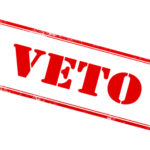There is a near-universal consensus among economists that increases in the minimum wage harm low-skilled workers the most. Originally designed to mimic racially discriminatory laws elsewhere, the minimum wage continues to be a means of picking certain classes and geographic locations over others. For example, the minimum wage benefits the high-cost-of-living areas in the Northeast over the lower-cost-of-living areas in the South.
It also benefits the more educated over the less educated, and as I have noted before in the Jefferson Journal, increases in the minimum wage benefit the healthy over the handicapped.
Governor Glenn Youngkin’s understanding of the dangers of government intervention in wages is best summarized in the Governor’s defense of his veto of HB1 and SB1 — which would have raised the minimum wage to $15 per hour. In his veto explanation, the Governor notes, “The free market for salaries and wages works. It operates dynamically, responding to the nuances of varying economic conditions and regional differences. This wage mandate imperils market freedom and economic competitiveness.”
Acknowledging the regional differences in impact, the Governor noted,
Implementing a $15-per-hour wage mandate may not impact Northern Virginia, where economic conditions create a higher cost of living, but this approach is detrimental for small businesses across the rest of Virginia, especially in Southwest and Southside. A one-size-fits-all mandate ignores the vast economic and geographic differences and undermines the ability to adapt to regional cost-of-living differences and market dynamics.
Even without the Governor’s signature, Virginia’s minimum wage was set to be indexed to the consumer price index beginning in October of 2024. This will keep the earning power of the current minimum wage intact going forward — which is a much more reasonable approach and will prevent a wage shock that will surely have an immediate negative impact on Virginia’s most vulnerable workers.
The Governor also vetoed a companion bill, HB157, that would have removed the long-standing exemption from the minimum wage for migrant and farm labor. Governor Youngkin clearly understands the truism written on many bumper stickers that “farmland lost, is farmland lost forever,” when he wrote in his veto explanation:
The agricultural sector has thin margins, and this bill will significantly affect the industry. The data from the USDA Census of Agriculture and the Weldon Cooper Center for Public Policy further emphasize the importance of supporting our agriculture industry. The loss of five thousand farms and nearly five hundred thousand acres of farmland in the last five years has dramatically altered our economy and communities.
It is refreshing to have a Governor who understands and can articulate important economic principles so clearly. We applaud Governor Youngkin for his bold use of the veto in defense of those the General Assembly foolishly put at risk when they passed these bills. We are thankful for the Governor’s clear desire to see the Commonwealth move forward with continued job growth, a strong economy, and healthy farming communities.
Derrick Max is president and CEO of the Thomas Jefferson Institute for Public Policy, which published this commentary today.
Steve Haner adds a note:
The tally of 2024 vetoes is now 87, a modern record if not an all time record. The Democrats passing 30 different ways to restrict guns Youngkin objected to greatly padded the total (and he did sign some gun-related changes, which is being ignored.) As of today, he has proposed amendments to 20 bills, and signed 264. More than half the pending bills are still under consideration.
Among those still to be acted upon by April 8 are the budget bill for the period starting July 1 and the caboose budget bill that amends spending for the current fiscal year. The revenue measures objected to by the Jefferson Institute, the digital sales tax and the mandate to rejoin the Regional Greenhouse Gas Initiative and return its carbon tax, are buried in those.
Also still pending from the list of veto targets Max previously highlighted are the bill creating the new Family Medical Leave Act salary replacement benefit and the change in insurance laws which is a major giveaway to the trial lawyer lobby, discussed today in this guest column in The Roanoke Times by former Governor and U.S. Senator George Allen.


Leave a Reply
You must be logged in to post a comment.